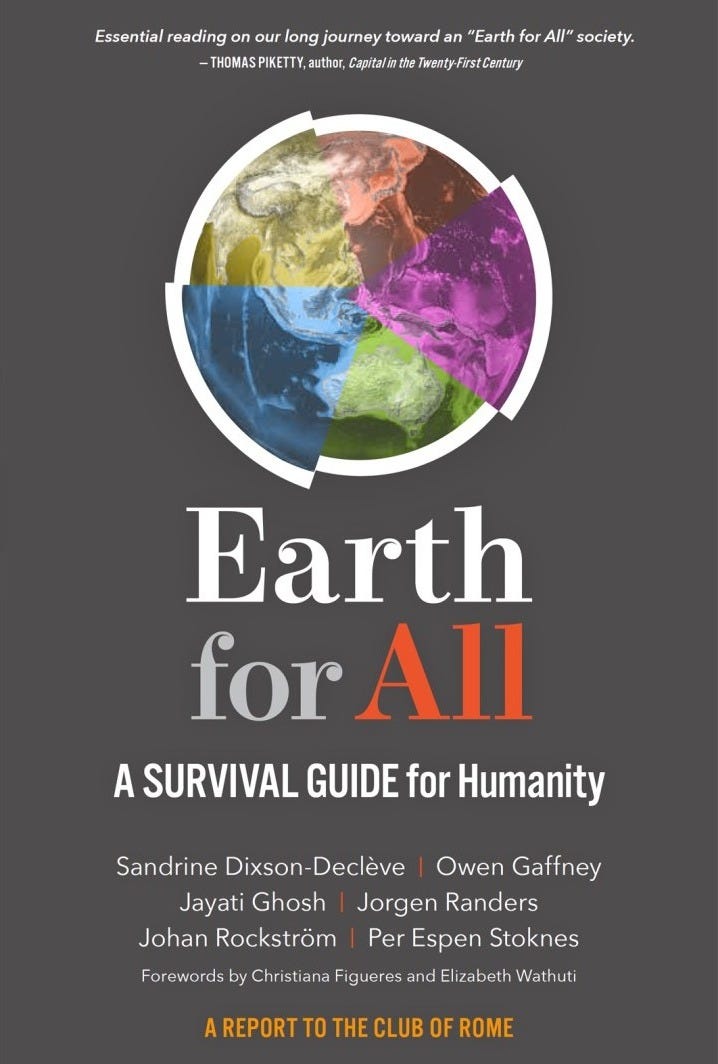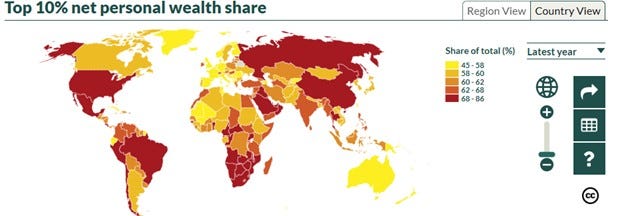Earth For All
A roadmap forward.
This isn’t so much a book review, as a discussion of the book Earth for All. I recommend you read the book yourself. It’s not too long, well under 200 pages, and is written in a very accessible style. Earth for All – A Survival Guide for Humanity (2022) was published by the Club of Rome, the same group that brought us The Limits to Growth in 1972.
The authors start by laying out five extraordinary turnarounds needed for global equity and a healthy planet. They are:
1. Ending poverty
2. Addressing gross inequality
3. Empowering women
4. Making our food system healthy for people and ecosystems
5. Transitioning to clean energy
Nothing revolutionary so far, these track the UN Sustainability Development Goals rather broadly. There are a few items I wish to highlight to engender further discussion.
- Dedicating 2 – 4% of global income to sustainable energy and food security
- Policies Ensuring the wealthiest 10% take less than 40% of national incomes
- Establishing citizen funds to distribute a Universal Basic Dividend.
The authors acknowledge that these changes will be disruptive. So be it, let’s be disruptive. If they were easy, they would have been done already.
Dedicating 2 – 4 % of global income to sustainable energy and food security.
I wrote about this recently this month (Climate Change Will Take Away Your Money).
The European Commission's long-term strategy "A Clean Planet for All" strategy posited a cost of addressing climate change at 2.8% of GDP, while the IEA projected a need for 3% of GDP investment until 2050 to combat climate change effectively. The world's GDP is about $101 Trillion (nominal, 2022). That means what is needed to mitigate climate change is about $3 trillion per year.
Addressing climate change (and other ecological overshoot issues) won’t be cheap. But dedicating a small portion of global income is the investment worth making, and in finance parlance, the action with the biggest return on investment (ROI). The World Economic Forum estimates that climate change costs the world $16 million per hour. To put things in human cost terms, the actuaries have gotten in on the fun and estimate that a baby born this year (2024) will lose $500,000 over its lifetime due to climate change. We already know that not acting on climate change will cost more than acting, so let’s get going.
Policies ensuring the wealthiest 10% take no more than 40% of national incomes.
Such policies are meant to ensure a more egalitarian distribution of resources and opportunities. There is a happy medium between one person controlling all wealth and all people mandated the same income. Past a certain point (40% is settled on by the book authors) the wealthier in a society can control the government and the institutions of the state to ensure that their interests always come first.
According to the World Inequality Database, we have a long way to go before less than 40% of wealth is controlled by the top 10%. The table below shows what percentage of that nation’s wealth is held by the top 10%.
It is important to note that wealth is not the same as income (the metric used in Earth for All). The wealthy often don’t have very high incomes from a typical job. Their wealth comes mainly from assets and investments. Either way, these numbers are far away from the 40 percent ideal.
You can see from the map below, that the concentration of wealth is the norm. In fact, no country on Earth from what I can see has less than 45% of wealth concentrated in the top 10%.
Universal Basic Dividend
One way the authors offer to address this inequality is a Universal Basic Dividend, so that the commons of a nation cannot be hoarded by those with the most wealth and power, but shared equally. We should factor in the risk involved in putting up the money to exploit those assets (sunk costs of a mine, oil well, etc.) However, we also need to factor in whether the investment of that mine, oil well, or other “societal common” should be exploited at all, and if so, to what extent.
I’m not going to pretend to have the policy answer to that question here. But surely we as a society can figure out a risk-sharing and incentive-sharing model that works to provide society with resources, but not at the expense of that society. Too often today, the costs of initial investments are public (the government incentivizes digging the oil well with subsidies) the profits are privatized, and the negative externalities (climate change) outweigh the short-term positive externalities (fuel to use in transport).
Here is how such a universal basic dividend could work:
1. The Private Sector is charged for extracting and using resources that should be seen as under the stewardship of all society. This can include fossil fuels, land freshwater, the ocean, minerals, the atmosphere, forests, etc.
2. The fees collected are put in a national Citizens Fund and the revenue is distributed back to citizens equally through a universal basic dividend.
Scenario Analysis
The authors talk about two distinct scenarios for the future.
- Too Little Too Late
- The Great Leap Scenario
The too little too late scenario is what we are in now, with some countries making piecemeal changes that don’t add up to meaningful action.
The authors introduce a Wellbeing Index juxtaposed against a Social Tension Index to show how each scenario plays out. Wellbeing is characterized by a society in which dignity, nature, connection, fairness, and participation are valued and set as goals. A society characterized by high social tension is characterized by a decline in well-being, trust, and equality within societies.
The Great Leap scenario would require governments to act to reshape markets and drive long-term visions for societies. The authors agree with me and many others that neither individuals nor markets on their own can get us the change we need.
As always, decide for yourself.
Earth for All is worth a read, and worth your time. There is far more in it than I touch on here, but I’m highlighting the big ideas in there that could turbocharge humanity into making real progress in digging us out of the hole we have dug for ourselves.
Setting aside 3% of global incomes to tackle our environmental problems today, so that they won’t be much more expensive tomorrow, fairer taxation systems that show us that we truly are in this together, and a universal basic dividend that allows us to all own the commons would be a great start, providing us the first few rungs on the ladder we need to get out of the hole we have dug ourselves.
So, let’s get to that.





Wouldn't it be revolutionary if it were to come to pass! What is remarkable is that this is all written, in beautiful detail, in so many places, but none of it implemented, EVER.
Despite my rusted on pessimism about the world, I am grateful you keep drawing our attention the fact there is a clear path to follow. The thinking has been done. We just have to start the journey. We can tweak it as we go.
Nice platitudes. I give them 0.005% chance.
The wealthy are not going to just give up the control of government that they've worked hard to purchase. As long as the highest form of so-called "democracy" is "voting," nothing is going to change.
Voting is short-term oriented. While the Club of Rome is asking for 3% to 4% to ameliorate our damage to the very habitat that allows us to live, your average voter is going to say, "I can't afford 3% to 4% more!" And the moneyed interests are all to willing to promote that message.
Right now, in Canada, the servants of the moneyed interest are screaming "AXE THE TAX!" about a carbon tax that is re-distributed to the lowest 50% of wage-earners. And they're sucking it up, the fools! Then, after the moneyed interests get elected, they'll say, "Hey, what happened to that $1,800 check I used to get every year?"
What I didn't see on that list was anything about social engineering. How will these changes be accepted by rich and poor alike?
Voting won't get us there. What is needed is sortition, or government office by random selection, similar to jury duty. That is much closer to "government by the people." Then, we need an ethic common in certain indigenous people: hold a big party every year, where those who are doing the best are expected to give it all away.
I just don't see the sort of societal changes necessary happening in a practical time-window. Government is just too big and too easily subverted and perverted. Instead, such changes will have to wait for post-crash times.
Rather, I think small groups of consenting people could do this at the community level. These small groups will have to be self-supporting in the larger scheme, and egalitarian from within.
But these "communities" are not the communities that Elon Musk or Mark Zuckerberg or Bill Gates live in.
In a world of declining energy resources, things are about to re-localize. If your community feeds itself and keeps a low profile, Elon, Mark, and Bill won't even know you exist, once the electricity goes out.